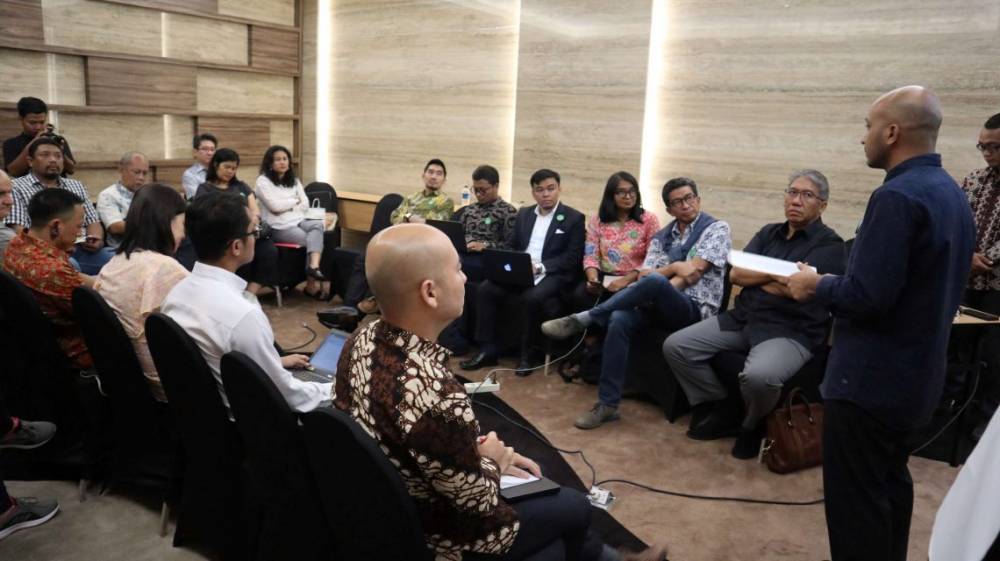WORKSHOP ON MAKING SUSTAINABLE COFFEE ATTRACTIVE FOR PRIVATE SECTOR
Jakarta (Indonesia), 26 April 2019 – This session is one of the four in-parallel workshops organised by SCOPI aside from the main event, Members Working Meeting. We are delighted to see the enthusiasm from the participants. Market players can be seen eager to listen and contribute to the discussion. It is after all the side of the business that links back profit to farmers that we held ourselves accountable to.
Attended by 25 participants from members, partners, and stakeholders, the workshop welcomed the attendance of resource persons such as Mr. Wisman Djaja (Nestle), Mr. Hutama Sugandhi (GAEKI), Mr. Suandi Darmawan (PRISMA), Mr. Heru Prama Yuda (Enveritas), Mr. Chandra Panjiwibowo (Rainforest Alliance), moderated by: Mr. Irvan Helmi, and minutes of meeting is provided by Ms. Dedy Syahputra Sijabat (PRISMA).
SCOPI’s partner, PRISMA provided us with insights on market systems development, the root causes of low agricultural performance, and what makes changes in market system.
The following topic have been addressed by Making Sustainability Coffee Attractive for Private Sector:
Key takeaway from PRISMA’s initiatives were that coffee price is an important factor when farmers make that decision to adopt certain good practices, there is a certain emphasis as well on the side of coffee buyers for their lenient standard of responsible coffee practices, and that cooperatives are highly influenced by conflicting interests affecting their business performance. Several questions remain to be solved around the critical issue of coffee prices, the roles of industry and other players in coffee sustainability and whether stakeholders are looking into the real root cause of sustainability issue.
One of SCOPI’s members and also supporters, Rainforest Alliance shared its views on sustainable coffee. Three things must be emphasized to claim sustainability: economically sustainable, socially sustainable and whether it is environmentally sustainable. Rainforest Alliance’s Farm Standards consist of four blocks that looks at farm management aspect, good farm practices, working conditions and environment aspects. The idea of having third party or a certification body to inspect the implementation of standards may contribute to objective analysis on what producers and business players claim as responsible sourcing. Sustainability standard, however useful as a guideline for specific implementation and monitoring, shall not be considered as the only way to ensure responsible coffee production, as it has to be complemented with various commitments and actions from stakeholders including governments, buyers and those at the upstream of the value chain.
It is evidential that private sectors run their business based on consumers’ demands. Both private sector and farmers yearn for favorable price, and while farmers strive to increase productivity, this corresponds with buyers’ interest to secure sustainable supply of coffee. The critical point next to production is how do these supply-demand system work within a responsible business framework.
The Indonesian Coffee Exporter Association (GAEKI/ICEA) confirms that buyers need assurance for continuous supply, however it is a little discomfort to learn that a lot of coffee exporters treat the coffee industry as merely profit-making business and less responsible to go the extra miles to keep farmers economy secure in order for them to provide quality and sustainable source of beans. This means a lot of burden to produce coffee that meet quality and environment standards at the farmers’ shoulders.
Pitching in to the discussion, Nestle representative admits that generally speaking private sector do have interests towards sustainable businesses but it really connects with profiteering and how the consumers appreciate sustainable products. It is highly debatable whether consumers understand at all the value increase if they opt for more responsible coffee, and the cost associated to producing them. Consumers normally pick less pricy products, and are less aware of how coffee get to their cups.
We want businesses to thrive, especially those who contribute to our farmers’ welfare and create employment, this means all actors have the responsibility to create awareness on the value of sustainable coffee, including the awareness of coffee lovers who are actually paying the price of coffee. The next action should be, how do we all work on this?
There were some highlights on how SCOPI as a multistakeholder platform could play a significant role to encourage sustainability agenda towards its corporate members, perhaps offering a collaboration initiative where investments can be made locally by private sector and local governments towards agreed indicators. And these indicators are made in a transparent manner, a bottom up measurable outcomes that farmers can also own. The problem then arises if a certain responsibility be made public and be imposed against members, as some are not on board yet to investing for sustainability. Not enough resources nor willingness.
Making sustainable coffee attractive for private sector provided the following recommendation/action plan
SCOPI conducts FGDs where private sector, NGOs, and a small number of small and medium enterprises can sit together to discuss solutions that can be offered to be implemented by SCOPI in fighting for coffee sustainability in Indonesia.
The FGDs will discussed possibilties of establishment of a model, combined with government and non-profit investments with co-sharing responsibility from farmer’s side as well as other enablers with the like of those financial institutions and even consumers; and this model is tested and deemed possible, in a way that it is profitable for business, it’s valuable for non-profits and justifiable for government entities.
Presentations:
PRISMA_Making Sustainable Coffee Attractive for Private Sector
Rainforest Alliance_Making Responsible Coffee Business the New Normal

